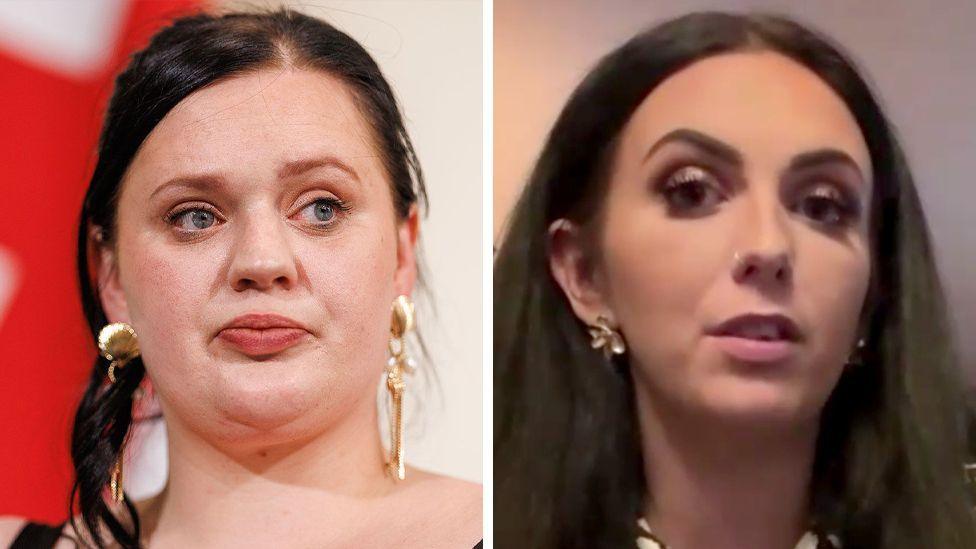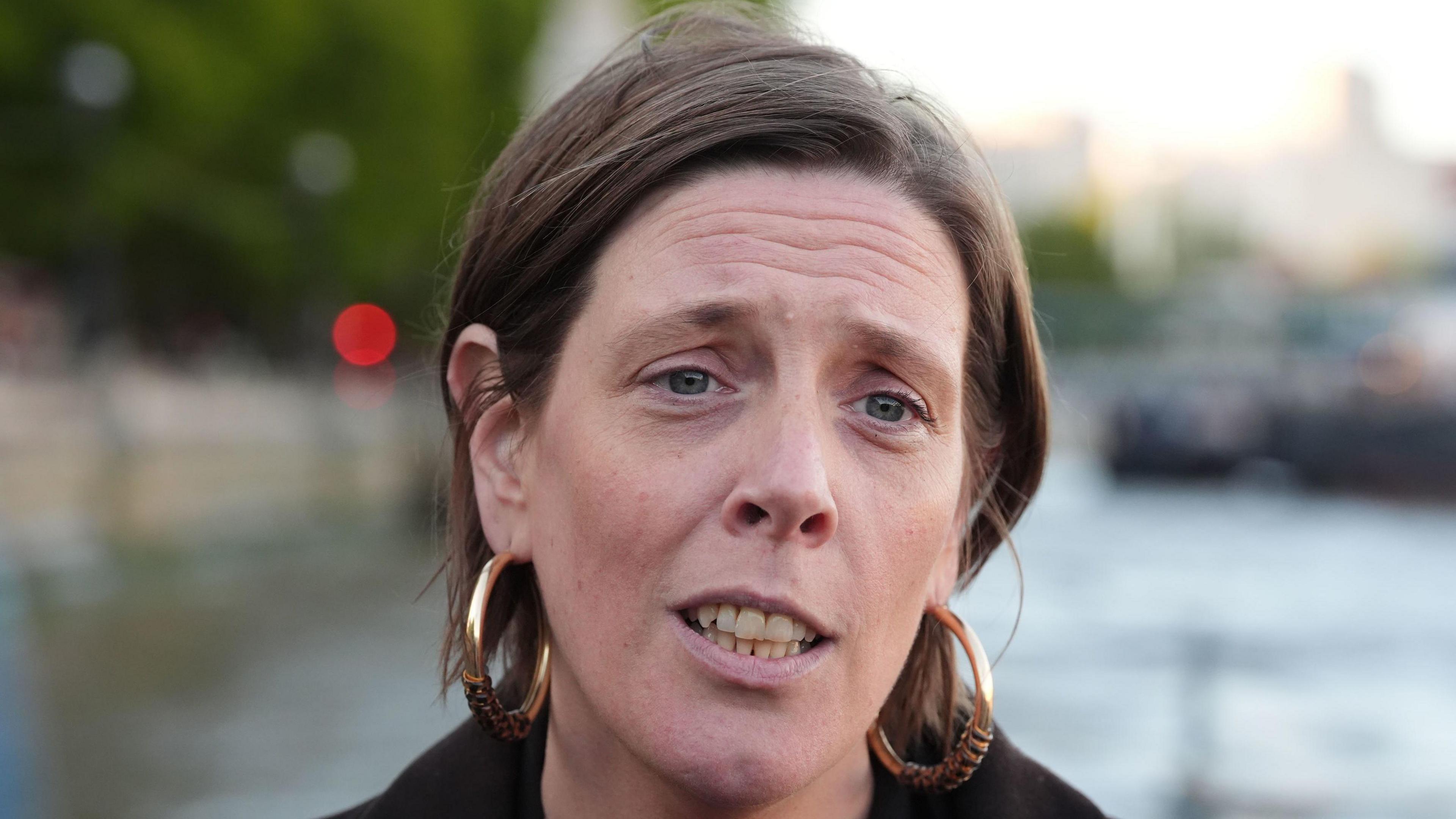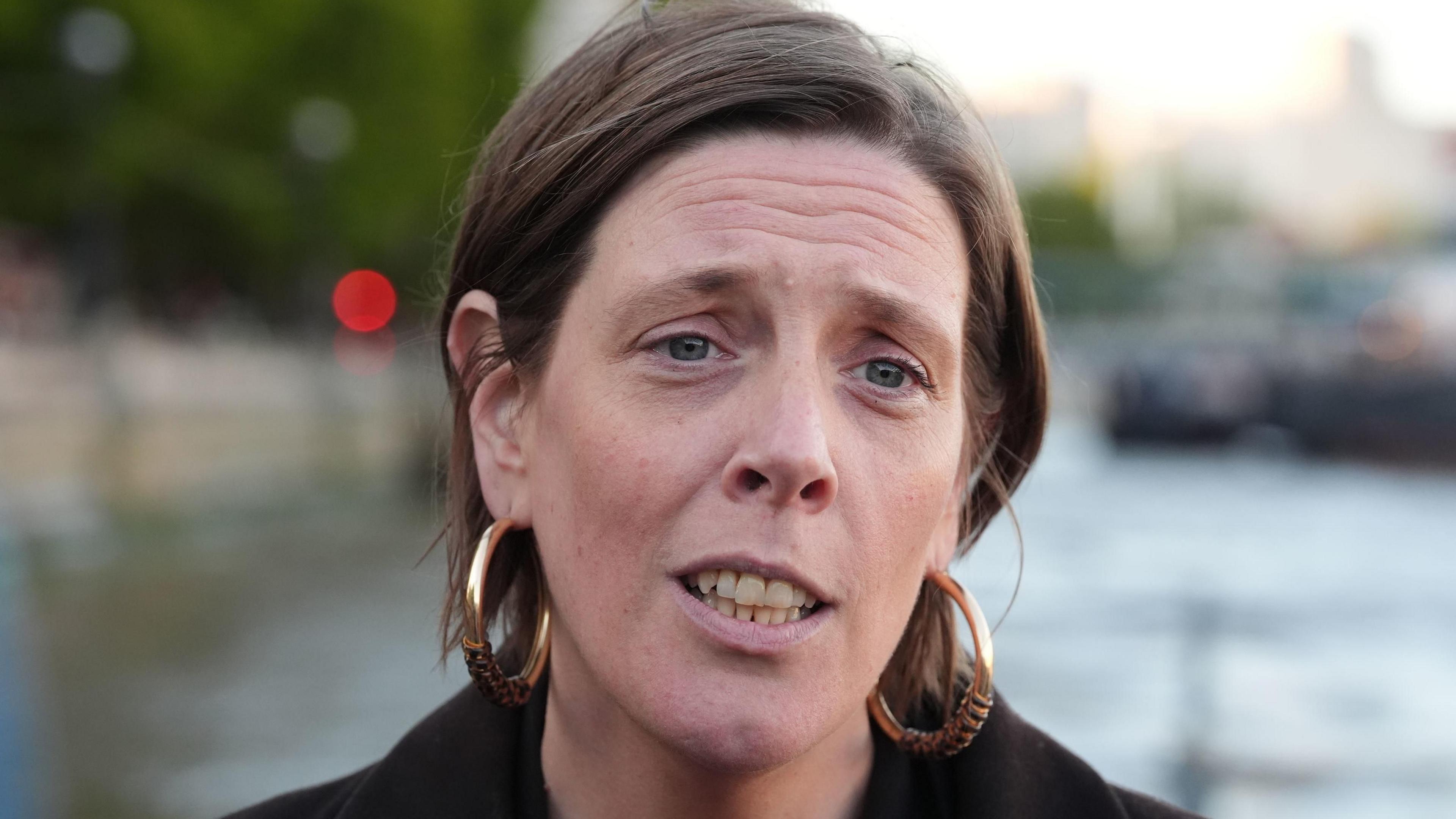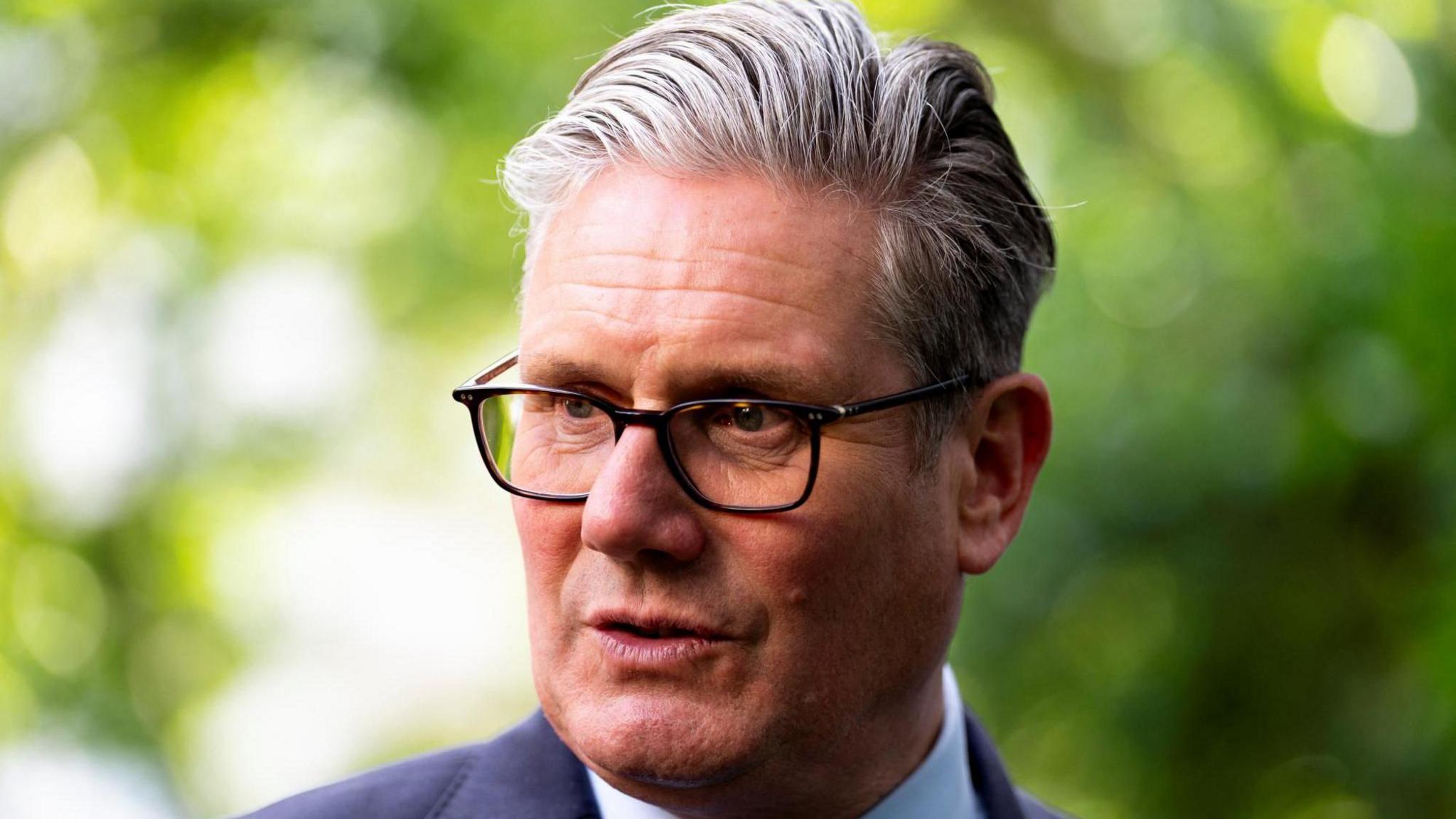Why is there a row over the grooming gangs inquiry?

Fiona Goddard (left) and Ellie Reynolds resigned from the inquiry panel on Monday.
- Published
A national inquiry into grooming gangs in England and Wales has been thrown into disarray by the resignations of four women from its victim liaison panel.
So, how did we get here, and what's next for this inquiry?
What is the inquiry about?
Prime Minister Sir Keir Starmer announced the inquiry in June this year.
The UK government said, external it would "co-ordinate a series of targeted local investigations" into the group-based child sexual exploitation of girls by grooming gangs.
Called the Independent Commission on Grooming Gangs, the inquiry will have legal powers to direct targeted investigations in local areas and summon witnesses to give evidence.
The government said once an independent chair had been appointed, the inquiry would decide which local areas to investigate based on information provided by the police, abuse survivors and members of the public.
The government says the process is not being managed by the Home Office, but by the independent child exploitation charity NWG Network.
The charity provides "support and guidance to those working with children and young people who are affected by abuse".
Why was it launched?
The grooming gang scandal was first exposed in 2003, in The Times newspaper, and has often been the subject of debate, inquiry and news reports in the two decades since.
It returned to prominence at the start of this year, partly because of tech billionaire Elon Musk, who criticised the prime minister for not calling a national inquiry.
A row between the two centered on high-profile cases where groups of men, mainly of Pakistani descent, were convicted of sexually abusing and raping predominantly young white girls in towns such as Rotherham and Rochdale.
At the start of the year, the government dismissed calls for a national inquiry, arguing the scandal had already been examined in a seven-year inquiry led by Professor Alexis Jay.
Professor Jay handed in her report to the then-Conservative government in 2022 but so far only two of her 20 recommendations have been implemented.
But for months, Sir Keir faced increasing political pressure for not being willing to set up a new national inquiry that was specially focused on grooming gangs.
In February this year, the prime minister commissioned veteran Whitehall troubleshooter Dame Louise Casey to evaluate the scale, nature and drivers of group-based child sexual exploitation and abuse (CSEA) at a national and local level.
In her review, external, Dame Louise recommended a national inquiry, co-ordinating a series of targeted investigations, to be launched into child sexual exploitation in England and Wales.
Sir Keir accepted the recommendation, saying it was "the right thing to do" based on what she had uncovered in her review.
What sparked the row over the inquiry?
The government said a panel of abuse survivors would be given a central role in the inquiry.
There are thought to be around 20 individuals on the panel, who are overseeing the process of setting up the inquiry.
This week, four women resigned from the inquiry's panel in protest at how the government had handled the process so far.
The women all wrote open letters raising similar concerns about suggestions the inquiry could be widened beyond grooming gangs, tight controls on what they could say and who they could speak to.
All four also expressed doubts about two candidates proposed to chair the inquiry.
They objected to the two because one had a background in social work and the other as a senior police officer - two professions facing questions about trust.
Both candidates have withdrawn from the process.
In her resignation letter, one of the women, Ellie Reynolds, said she felt the inquiry had become "less about the truth and more about a cover-up".

Safeguarding minister Jess Phillips has faced criticism from some survivors
Safeguarding Minister Jess Phillips denied claims of a cover-up and insisted the government was "committed to exposing the failures".
The group of four abuse survivors have been particularly critical of Phillips and demanded her resignation in a list of conditions for them to re-join the inquiry.
The women have accused Phillips of "betrayal" over comments she made about the scope of the inquiry.
On Tuesday, Philips answered an urgent question tabled in the Commons by the Conservatives on "recent criticism" of the inquiry.
Phillips told MPs "allegations of intentional delay, lack of interest or widening of the inquiry scope or dilution are false".
That prompted a response from one of the abuse survivors, Fiona Goddard, external who said "for Phillips to suggest that any accusations of the scope being expanded .. is untrue is a lie and she knows it".
But five others abuse survivors have written to the prime minister to say they will only continue working with the inquiry if Phillips keeps her job.
The second group of survivors, headed by Samantha Walker-Roberts, has written to Sir Keir and Home Secretary Shabana Mahmood with a list of seven conditions for their continued support.
"Jess Phillips has remained impartial to the process, only listening to feedback [and] we want her to remain in position for the duration of the process for consistency," they wrote.
Has the focus of the inquiry been changed?
One of the main concerns of many victims is that the inquiry must have a tight focus on the issue of grooming gangs.
Ms Goddard said, external the NWG Network charity had sent a list of "questions for reflection" to panel members. She published it on social media this week.
It includes "What do you most want the inquiry to achieve? What areas should it focus on? And "How can the inquiry best involve and engage victims and survivors throughout its work?"
One of the questions asks "Should the inquiry have an explicit focus on 'grooming gangs' or 'group-based CSEA' (Child Sexual Exploitation and Abuse) or take a broader approach?".
Ms Goddard says she then texted Jess Phillips directly about this on Friday, 26 September.
She posted a screenshot of the text she had sent asking Phillips "sorry to message again but if it's supposed to be about grooming gangs why has the charity that the Home Office has set up to consult with survivors just sent out the agenda for the questions that are going to be asked".
She sent Phillips the question about the inquiry's focus.
Ms Goddard wrote "every which way this is being manipulated away from what it was supposed to be and it's unfair".
She also posted Phillips' reply, external, which said "the reason for the question is because there have been differing views and we want you to be able to give a clear steer on what you want".
Phillips added: "I know it's hard to trust but I can promise you no one is trying to manipulate the response and it is my view that it is only a grooming gangs specific inquiry but it is not right for me to make that decision without it being formally consulted on."
The victims panel began having meetings in the past week, including to question candidates being proposed to chair the inquiry.
What's next for this inquiry?
There is no suggestion that the inquiry is about to be shelved, despite the recent turmoil.
And multiple government sources have told the BBC there is a widespread determination - from No10 to the Home Office - to keep Phillips in post.
Senior figures in government are acutely aware that the victims of sexual abuse have been repeatedly and profoundly let down by multiple agencies of the state – and so establishing trust is incredibly difficult.
Efforts are still under way to find a chair that everyone involved can support - a process that has already taken five months.
The government is expecting it to be several months before they appoint a chair.
Ministers keen desperate to ensure whoever takes on the role has the desire and stamina to stick it out, under intense scrutiny.
"The government will now re-engage with the victims and survivors - to listen to their concerns and take their opinions on the type of person they want to lead the inquiry," the BBC was told.
Dame Louise Casey said she wanted the inquiry to be completed within three years - a relatively short period for inquires of this nature - but the government has not agreed to a final timeline.
Some abuse survivors and the Conservatives have called for a judge to be in charge of it.
At PMQs, Sir Keir said "whether the inquiry should be judge-led was looked at" by Dame Louise and she had decided against it for two reasons.
The prime minister said the first reason was "the speed with which we could do this".
Summarising the second reason, Sir Keir said: "One of the problems that judge-led inquiries run into - I have seen and experienced this myself - is that they are often held back until the end of the criminal investigations, and I was determined that we would be able to run the two together."
On Wednesday, Sir Keir Starmer told MPs the inquiry would not be "watered down" and its scope would not change.
"It will examine the ethnicity and religion of the offenders, and we will find the right person to chair it," Sir Keir said.
He said Dame Louise would now support the work of the inquiry, which ministers will be hoping can help get it back track.
Related topics
- Published23 October

- Published15 June
